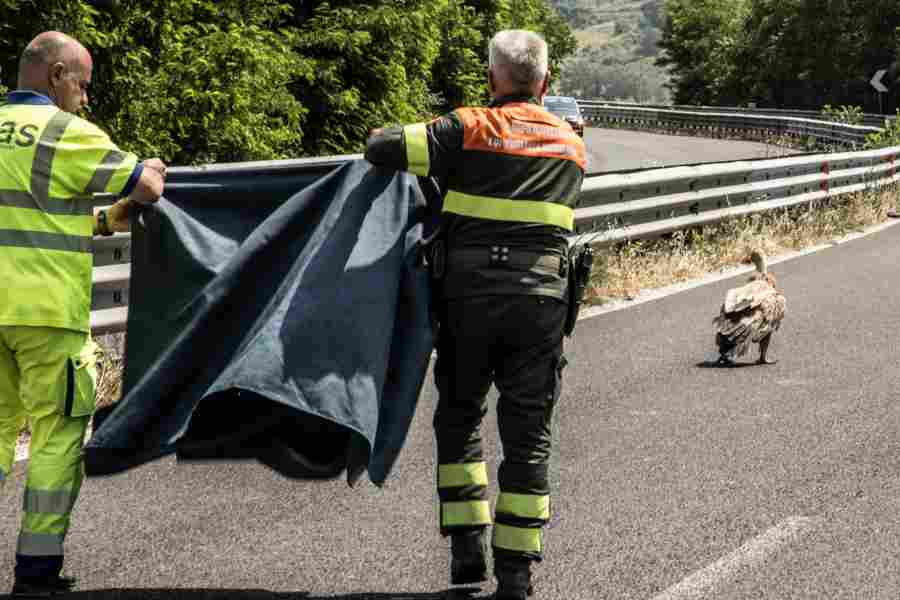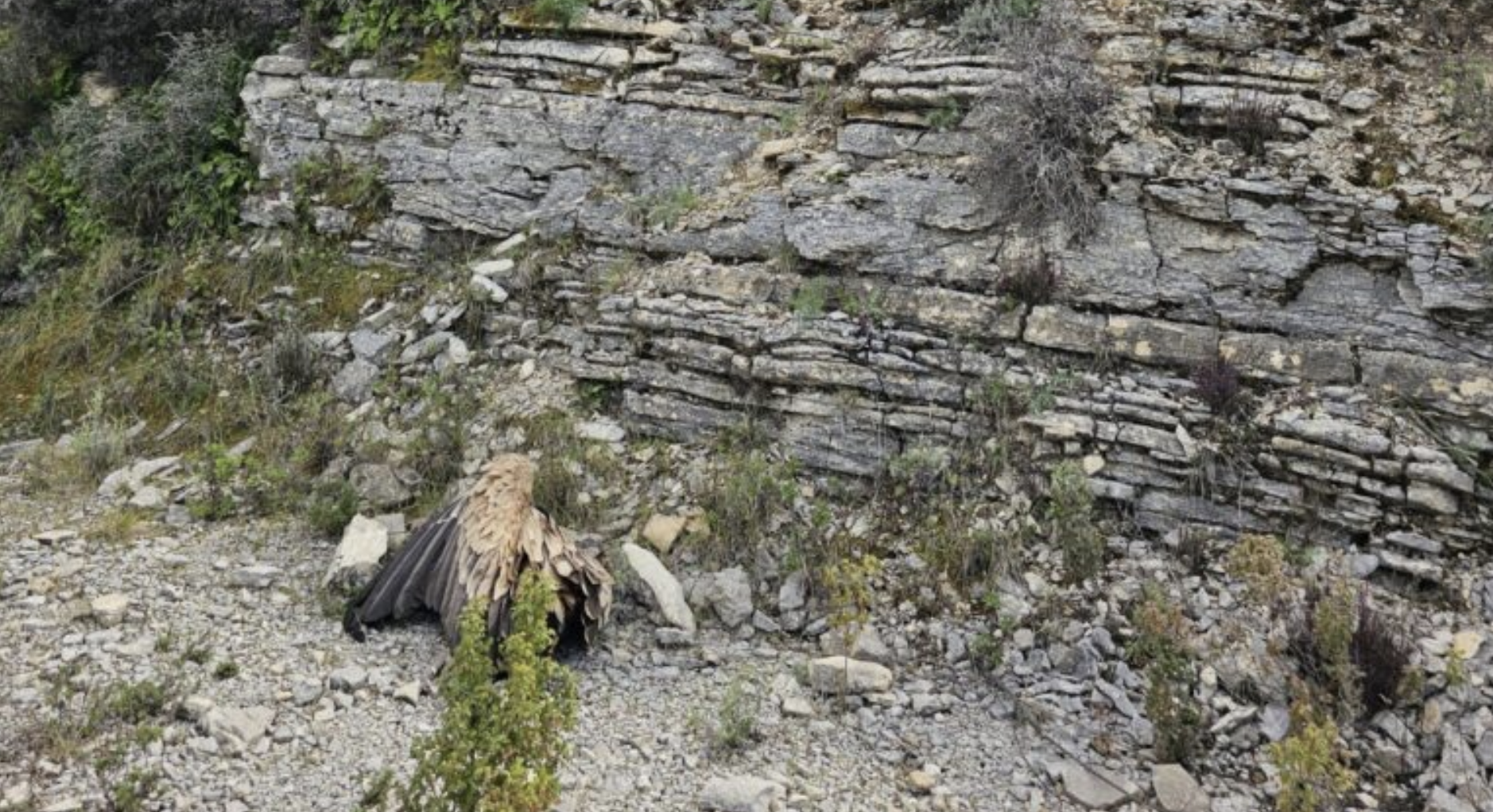
At the end of April, a mature Griffon Vulture marked with a GPS transmitter was discovered dead in the area of Studen Kladenets Reservoir in the Eastern Rhodopes. Now it’s confirmed that lead poisoning killed the vulture, which is an overlooked threat.
Lead poisoning strikes again
The recent mortality of the Griffon Vulture is the first recorded death caused by lead poisoning for the species in Bulgaria. Tests showed old lead ammunition inside the vulture’s body and proved positive for lead poisoning as there was increased lead concentration in the blood. According to experts from the Bulgarian Society for the protection of Birds (BSPB), the first to report the case, the incident reaffirms that lead poisoning poses a severe threat to many vulture populations not only on the Balkans but throughout Europe. This case also reiterates that poaching is still a serious problem.
The dead Griffon Vulture (c) BSPB
At the end of April, the anti-poisoning team located the dead Griffon Vulture after receiving alarming signals from the satellite transmitters indicating lack of movement. The vulture was an adult female that had a reduced breeding performance for the last three years. At that time, the increased concentration of lead in the bird’s blood and her behaviour raised doubts about chronic lead poisoning that were later confirmed. “Proving such cases is extremely difficult as lead contamination could remain undiagnosed. Often as a result of poisoning, birds may suffer strange their behaviour that may increase the likelihood of collisions with power lines, development of bacterial infection due to deteriorated immune system, etc., which mask the root cause,” commented Volen Arkumarev of BSPB.
The autopsy

The body was transported to the Green Balkans Wildlife Rescue Center in Stara Zagora, where the experts performed an autopsy and detected changes in the bird’s liver. An X-ray enabled the cleared identification of bullets in the vulture’s wing. As a result, a Bulgarian laboratory conducted a very detailed analysis estimating the amount of lead accumulated in the liver and the bones, which are the primary depots for heavy metals. “As a result of the autopsy, X-rays and laboratory analysis we can say without any doubts that the vultures suffered from chronic lead poisoning, which probably originates from the lead bullets in the wing, “Arkumarev adds further. According to the experts, the origin of the lead bullets cannot be accurately identified, but it is clear that the bird was shot a long time ago but recovered from the trauma. There are many possibilities – the vulture may have been shot during her youth wanderings or migration in the Middle East, Turkey or later on somewhere in the Balkans. In several countries, and especially in the Middle East, poaching remains a huge problem and many organizations are dealing with the issue, and in recent years the governments of Lebanon, Egypt and Jordan have taken decisive steps to resolve these problems.
Lead poisoning is an overlooked threat to Vultures
Lead exposure, primarily through ingestion of lead ammunition, poses a severe threat to vultures, according to research. Just like in the recent case of the poisoned Griffon Vulture, ammunition used by game hunters can severely poison vultures and is a threat that is often overlooked. Often, hunters who kill animals leave their carcasses behind and vultures feeding on them ingest lead fragments from the bullets, causing health problems. These problems can vary, from inhibiting proper metabolic functions to having adverse effects on the nervous system. Acute poisoning can result in weakness, inhibited movement, paralysis, hindered respiration, behavioural abnormalities, weight loss, immune system disruptions and bone mineralisation. In severe cases, it might also lead to death. However, the research is still relatively recent, and this journal asks for further exploration:
“There is an urgent need to evaluate the effect of this contaminant on vulture demography, since some species may be undergoing important reductions on their populations due to this threat. A silent threat such as lead may produce long-term population decreases that are difficult to detect or reverse and thus, merits special attention.”
Protecting vultures from lead poisoning

In recognition of the impacts of lead poisoning or contamination, we here at the Vulture Conservation Foundation are committed to protecting vultures from lead poisoning. We are working with other conservation organisations, hunters and governments towards passing laws and regulations to minimise this threat.
Lead poisoning was recognised as an important issue in the Vulture Multi-species Action Plan a global plan for the conservation of 15 species of vultures, co-developed by the Vulture Conservation Foundation which called for the phasing out of its use. As well as causing toxicosis as the authors of the study highlighted some common effects on vultures are actually sub-lethal, reducing their breeding performance and negatively altering their movement patterns, and increasing the likelihood of collisions with power lines.
Across Europe, there have been several initiatives to reduce the use of lead ammunition and promote lead-free hunting practices. In the Italian Alps the use of lead ammunition has been banned in the Stelvio National Park and Sondrio Province. At Hohe Tauern National Park in Austria, in the Pyrenees, and as part of our GypConnect and GypHelp LIFE conservation projects, at the Cévennes National Park in the French Massif Central, and in Haute-Savoie, pilot projects where hunters try non-lead ammunition are being carried out.
We are also incredibly pleased that the Generalitat Valenciana have banned the use of lead ammunition in two areas in Maestrazgo, a very positive move to protect vultures there including birds released as part of the new bearded vulture reintroduction project.
Furthermore, to minimize this threat that is often overlooked, the LIFE RE-Vultures project is currently working to reduce the use of lead ammunition by promoting lead-free hunting practices.
LIFE Re-Vultures

Starting in 2016, the five-year LIFE RE-Vultures project was developed by Rewilding Europe, in collaboration with the Rewilding Rhodopes Foundation the Bulgarian Society for the Protection of Birds, WWF Greece, the Hellenic Ornithological Society and us here at the Vulture Conservation Foundation. The aim of the project is to support the recovery and further expansion of the populations of Cinereous and Griffon Vultures in the cross-border region of the Rhodope Mountain by improving natural prey availability, monitoring movements of birds to help understand the threats they face and carrying out activities that will reduce the mortality of the populations from threats such as illegal wildlife poisoning and collisions with electricity infrastructure.


You can stay up to date with all vulture news by subscribing to our monthly newsletter!







